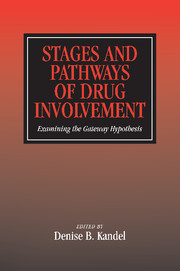Book contents
- Frontmatter
- Contents
- List of Contributors
- Foreword
- Preface
- Part I Overview
- Part II Recent Substantive Findings: What Do We Know About Stages of Drug Use, Risks, and Protective Factors?
- Part III Impact of Prevention Interventions: A Test of the Progression Hypothesis
- 6 Preventing the Onset and Developmental Progression of Adolescent Drug Use: Implications for the Gateway Hypothesis
- 7 The Gateway Theory Applied to Prevention
- 8 Intervention Effects on Adolescent Drug Use and Critical Influences on the Development of Problem Behavior
- Part IV Methodological Issues and Approaches: Advantages and Limitations of Alternate Methods
- Part V Animal Models and Biological Processes: Implications for Drug Progression
- Part VI Conclusion
- Index
6 - Preventing the Onset and Developmental Progression of Adolescent Drug Use: Implications for the Gateway Hypothesis
Published online by Cambridge University Press: 25 July 2009
- Frontmatter
- Contents
- List of Contributors
- Foreword
- Preface
- Part I Overview
- Part II Recent Substantive Findings: What Do We Know About Stages of Drug Use, Risks, and Protective Factors?
- Part III Impact of Prevention Interventions: A Test of the Progression Hypothesis
- 6 Preventing the Onset and Developmental Progression of Adolescent Drug Use: Implications for the Gateway Hypothesis
- 7 The Gateway Theory Applied to Prevention
- 8 Intervention Effects on Adolescent Drug Use and Critical Influences on the Development of Problem Behavior
- Part IV Methodological Issues and Approaches: Advantages and Limitations of Alternate Methods
- Part V Animal Models and Biological Processes: Implications for Drug Progression
- Part VI Conclusion
- Index
Summary
Efforts to combat the problem of drug abuse have involved a combination of strategies including education, treatment, law enforcement, and mass media campaigns. Among these, approaches intended to prevent the onset and developmental progression of drug use among adolescents have received considerable attention in recent years. A particularly fruitful area of research has involved the development and testing of school-based prevention approaches targeting youth during the early adolescent years. This research has demonstrated that at least some approaches to drug abuse prevention can produce substantial reductions in the incidence and prevalence of adolescent drug use. Moreover, this research clearly indicates that ongoing intervention during junior high school can result in durable prevention effects that last at least until the end of high school. Finally, the effectiveness of school-based prevention approaches has been demonstrated for a relatively broad range of students including White, suburban youth, and inner-city minority youth.
A necessary precondition for the development of effective prevention approaches is an understanding of both the causes of drug use and its developmental progression. Together they provide essential information concerning the nature and timing of preventive interventions. Research delineating the etiologic determinants of adolescent drug use has highlighted the importance of an array of interpersonal and intrapersonal factors for promoting and sustaining drug use and has provided guidance to program developers concerning the appropriate focus of preventive interventions.
- Type
- Chapter
- Information
- Stages and Pathways of Drug InvolvementExamining the Gateway Hypothesis, pp. 115 - 138Publisher: Cambridge University PressPrint publication year: 2002
- 8
- Cited by



